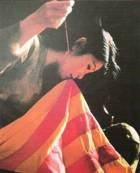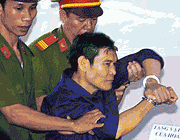Vietnam: End Attacks on Year-Old Democracy Movement
Government Still Imprisons Writers, Religious Leaders, Rights Lawyers
(Washington, DC, April 6, 2007)
– On the eve of Bloc 8406’s first anniversary, members of the group, which calls for greater political freedom in Vietnam, still face harassment and abuse, including imprisonment, Human Rights Watch said today
Several key organizers of Bloc 8406 and their families have been harassed and imprisoned, showing that the Vietnamese government is still trying to silence its critics.
Sophie Richardson, deputy Asia director at Human Rights Watch.
The Vietnamese government should end its persecution of citizens trying to exercise their rights to free expression and assembly, Human Rights Watch said. The group’s name, Bloc 8406, derives from the 8th of April 2006, when it published its “Manifesto for Freedom and Democracy.” Two days earlier, it had also issued an “Appeal for Freedom of Political Association.” These documents, which were initially signed by more than 100 people, challenged the Vietnamese government to uphold individuals’ rights to free expression, association, and participation in political affairs. By August 2006, an additional 2,000 people had signed the statements. Among the Bloc’s founders are Father Nguyen Van Ly, an outspoken supporter of religious freedom, writer Do Nam Hai, and professor Nguyen Chinh Ket. “Several key organizers of Bloc 8406 and their families have been harassed and imprisoned, showing that the Vietnamese government is still trying to silence its critics,” said Sophie Richardson, deputy Asia director at Human Rights Watch. “Targeting the most vocal, visible activists sends a message to the others: don’t speak out, or you’ll suffer the same fate.” Five 8406 members have in the past year been sentenced to actual or suspended jail terms. On March 30, Father Ly was sentenced under article 88 of the penal code to eight years in prison for “carrying out propaganda against the Socialist Republic of Vietnam.” A photo of Father Ly being physically muzzled during his trial by an out-of-uniform police officer has circulated widely. That day Nguyen Phong and Nguyen Binh Thanh were also sentenced, while Le Thi Le Hang and Hoang Thi Anh Dao received suspended sentences. Attorneys Nguyen Van Dai and Le Thi Cong Nhan both remain in jail. Nguyen Ngoc Quang, Pham Ba Hai, Truong Quoc Huy, and Vu Hoang Hai were all arrested in August 2006 and charged under article 88. They remain in detention and have not been brought to trial. Of grave concern is the arrest and subsequent disappearance of lawyers Le Quoc Quan, and Tran Thuy Trang. On March 8, 2007, Quan, a lawyer who had returned from a fellowship at the National Endowment for Democracy in the United States, was taken into custody and charged with violating article 79 of the penal code, attempting to overthrow the people’s government. The day before, Trang, a young lawyer in the Ho Chi Minh City office of Quan & Brothers, was arrested by reportedly 60 security police and has not been heard from since. Her family was forced to sign documents promising not to discuss the arrest.
Neither Quan nor Trang has been seen or heard from since their respective arrests. Another founder of Bloc 8406, Do Nam Hai, has been under constant police harassment since the manifesto was circulated. Security police have ransacked his home, seized his computer, disconnected his Internet access, and forced him to appear for regular interrogations. When Hai refused to quit Bloc 8406, authorities forced his elderly parents, his sister and his daughter to come to the local police station and pressured to plead with Hai to withdraw from the democracy movement. In February 2007, Hai was one of the recipients of the prestigious Hellman/Hammett award, which honors writers who are face political persecution. Bloc 8406 is not the only movement under threat. The government continues to harass, arrest, and impose restrictions on members of independent trade unions and unsanctioned religious groups such as ethnic minority Christians in the northern and central highlands, Mennonites, and members of the Unified Buddhist Church of Vietnam (UBCV). In January, Hien Quoc Tran, spokesperson for the United Worker-Farmers Organization, an independent trade union that was formed last year, was arrested. In March authorities harassed and interrogated several Buddhist monks and a Buddhist youth leader affiliated with the UBCV Buddhist Youth Movement. In March, UBCV Buddhist monk Thich Thich Thien Mien, who formed an association of former political and religious prisoners following his release in 2005 after 26 years in prison, was called for interrogation on accusations of anti-government activities. Authorities continue to arrest and imprison Montagnards in the Central Highlands – more than 350 of whom are currently serving sentences – for their worship in an unsanctioned Christian church and their participation in a peaceful movement calling for land rights and religious freedom. Last month, Human Rights Watch characterized the Vietnamese government’s ongoing crackdown on dissent, underway since November 2006, as the worst in 20 years. “Since Vietnam joined the World Trade Organization, it wants to be seen as a reforming, law-abiding nation,” said Richardson. “But arresting, ‘disappearing,’ and harassing dissidents and their family members shows that the rhetoric doesn’t match the reality.”
http://hrw.org/english/docs/2007/04/06/vietna15664.htm
Inscription à :
Publier les commentaires (Atom)




Aucun commentaire:
Enregistrer un commentaire